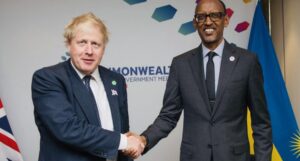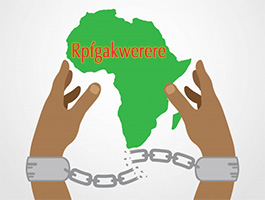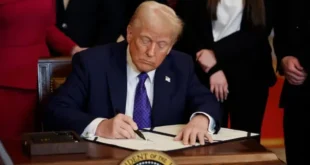Westminster may have shunned Putin, but its continued support of autocratic leaders stinks of hypocrisy
By: Ian Birrell
Among other despots the government courts, Rwanda’s President Paul Kagame can match Russia’s for cold-hearted ruthlessness. So much for resistance in defence of democracy
This is a tale of two dictators. Both have a background in espionage, trained in the dark arts of intelligence and security. Both became president in 2000 and proved themselves masters at controlling their countries by crushing dissent, stifling democracy and stealing elections. Both imprison or kill political foes, even those who fled into other nations for sanctuary. Both silence journalists and use state-controlled media to pump out a twisted narrative to further their own rule. Both treat state assets as their own. And both invade neighbouring nations and meddle abroad with disastrous consequences for millions of innocent people.

One of them is Vladimir Putin, now firmly established as Public Enemy No 1 for the free world after his latest assault on Ukraine. The full-scale invasion and atrocities unleashed by this self-serving despot have finally shocked the complacent West into action as it witnesses his attack on a sovereign nation. His misjudgement has turned Russia into a pariah state as the West tries to throttle his economy and sends his billionaire pals scurrying into safety with their stolen assets. As the Kremlin bombs cities such as Kyiv and Kharkiv, Mariupol and Mykolaiv, one in four of the country’s citizens were displaced from their homes in just three weeks.
This is distressing to witness – just as it was depressing to see the slaughter of pro-democracy protesters, theft of Crimea and separatist insurgency stirred up by this malevolent man in 2014. But at least this time there has been a decent response from fellow democracies, along with much talk of how the world has seen one of those pivotal turning points in history. This is gratifying for those of us who have long argued that we need to take a tough stand against dictatorship, boost our defences, drive out dirty money and safeguard our precious democracy.
Now turn to that other blood-stained bully. Paul Kagame can match Putin for chilling repression and cold-hearted ruthlessness. He has even sent hit squads into Britain to snuff out enemies. But there are two key differences between this pair of dead-eyed dictators. First, Kagame runs a small country in Africa rather than one of the great global powers – although this did not stop him sparking wars that led to five million deaths. And second, he is seen as such a friend of Britain that we prop up his regime with torrents of aid, train his troops and have even awarded him the honour of hosting the next Commonwealth summit in three months’ time.
The hypocrisy stinks when Westminster severs all links with the dictator in Moscow but will happily send Prince Charles to hobnob with his despotic soulmate in Kigali. Rwanda was never even a British colony. Yet politicians of all persuasions pander to the sinister thug who runs the country as he manipulates his history like Putin. Perhaps the reason is simple, if disturbing, as suggested by Michela Wrong, author of a devastating book on Kagame’s regime: victims of his machinations are black Africans, not white Europeans, so deemed of less value to our own political tribes.
Regardless, this shows the shallowness of the response to Ukraine – along with the hollowness of suggestions that democracies are facing up to the threat posed by autocracies. Nowhere do we see this failure more than Britain, for all the fine words suddenly spewing from the mouths of ministers as they distance themselves from Russian-linked party donors. The Prime Minister rushes off to fawn over the feudal Saudi Arabian regime that chopped up a dissident journalist, stirs up sectarianism around the planet and conducts a savage war with our weapons in a neighbouring nation. Then Boris Johnson returns to chip away at our democracy again by stirring up divisions with a foolish, bogus comparison between Brexit and Ukraine’s fight for freedom.
Next, it emerges that his Foreign Secretary has permitted the appointment of a diplomat who played a central role in the kidnap and detention of Rwanda’s most famous human rights activist. Liz Truss has been touring the world posing as a crusader for liberty with speeches about the “free world standing its ground” in the fight to combat autocracy. Yet she seems to have resisted calls to use her powers to stop Johnston Busingye, Rwanda’s former justice secretary, from becoming high commissioner – although he was demoted by Kagame after admitting their regime chartered a flight that led to the seizure of Paul Rusesabagina, the real-life hero of the film Hotel Rwanda who saved more than 1,200 lives in the 1994 genocide.
Busingye should have been placed on the Magnitsky Sanctions list, which targets people behind human rights violations. He was even named in Parliament by Sir Iain Duncan Smith alongside Iranian torturers and Sudanese war lords in a debate on sanctions. The former Tory leader queried why Kagame would send this “abusive individual” to represent his nation. “Do they think the UK is a soft touch?” he asked. The answer from Truss seems to be yes – even at this time of heightened alert over the dangers of aggressive dictatorship – for the current holder of the post claims the appointment has been confirmed, reports the East African.
So much for Westminster’s resistance in defence of democracy. Instead, for all the posturing, our politicians fail to understand that Putin’s behaviour is not some kind of Russian aberration but symptomatic of the autocratic model of government. His invasion of Ukraine was a sign of personal failure by a despot who felt threatened by emergence of a freer nation on his borders, one that challenged his venal rule as it shifted towards democracy and liberal European values.
The same hopes, the same issues, the same struggles, are seen around the world from Moscow to Minsk, from Cairo to Caracas – East African newspaper and from Hong Kong to Kigali. But even amid the horrors of Ukraine, our rulers fail to rise from their torpor.
 Africa Just another WordPress site
Africa Just another WordPress site


